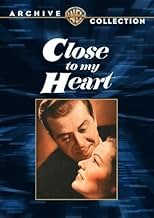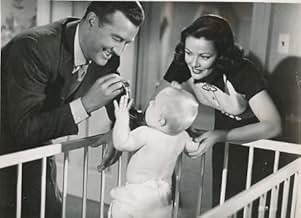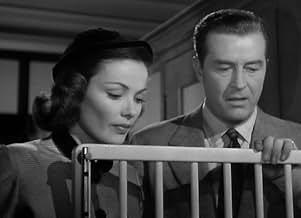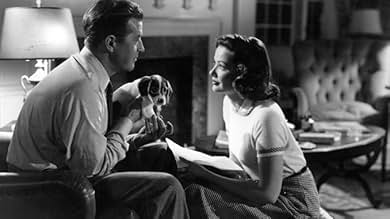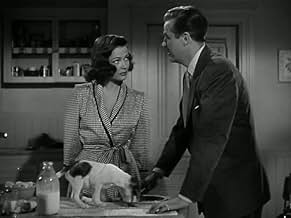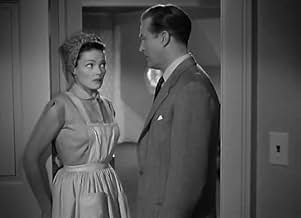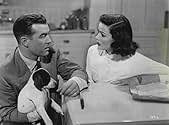Füge eine Handlung in deiner Sprache hinzuA columnist and his wife deal with obstacles when they try to adopt an abandoned baby.A columnist and his wife deal with obstacles when they try to adopt an abandoned baby.A columnist and his wife deal with obstacles when they try to adopt an abandoned baby.
Baby John Winslow
- Baby Danny
- (as Baby John)
John Alvin
- Prospective Adoptive Father
- (Nicht genannt)
Rodney Bell
- Young Parent in Car
- (Nicht genannt)
Nan Boardman
- Woman Patient
- (Nicht genannt)
Ralph Byrd
- Charlie
- (Nicht genannt)
Luther Crockett
- Prison Warden
- (Nicht genannt)
Douglas Hudson Finley
- Baby in other car
- (Nicht genannt)
Elizabeth Flournoy
- Dr. Williams's Receptionist
- (Nicht genannt)
Dick Gordon
- Clothing Store Owner
- (Nicht genannt)
Fred Graham
- Prison Guard
- (Nicht genannt)
Empfohlene Bewertungen
Ray Milland and Gene Tierney star in a near remake of Penny Serenade. They can't have children and explore the avenue of adoption. In the Beulah Bondi role of the agency inspector, Fay Bainter takes over. If you've seen her in Journey for Margaret, you know she can come across as concerned for children very well. This one has a couple of differences, mostly to do with Gene's character versus Irene Dunne's original version. Irene is sweet and deep-feeling, but Gene seems incredibly insincere and impulsive.
Everything out of Ray's mouth is hilarious and witty, adding a refreshing comic element to the story. I happened to agree with his side of the argument about adoption, but unfortunately, Hollywood took Gene's side. She's made out to be a natural mother who can't resist the baby in question, but I didn't believe her for a second. As is the case with many couples who have a great relationship, once child-rearing enters into the mix, fights and incompatibilities float to the surface. Ray and Gene were happy at the start of the movie, but when she becomes obsessed with the idea of adopting this particular baby, it strains their marriage. This movie also tackles the nature vs. Nurture debate that has stumped experts through the ages. If you have a strong opinion one way or the other, you might not like the message of the film. And while it's not as good as the original version, if you like the cast, you might want to give it a shot.
Everything out of Ray's mouth is hilarious and witty, adding a refreshing comic element to the story. I happened to agree with his side of the argument about adoption, but unfortunately, Hollywood took Gene's side. She's made out to be a natural mother who can't resist the baby in question, but I didn't believe her for a second. As is the case with many couples who have a great relationship, once child-rearing enters into the mix, fights and incompatibilities float to the surface. Ray and Gene were happy at the start of the movie, but when she becomes obsessed with the idea of adopting this particular baby, it strains their marriage. This movie also tackles the nature vs. Nurture debate that has stumped experts through the ages. If you have a strong opinion one way or the other, you might not like the message of the film. And while it's not as good as the original version, if you like the cast, you might want to give it a shot.
This rather obscure little film from '51 must have been one that attracted GENE TIERNEY, given the circumstances of her private life wherein her own parentage problems came about when her pregnancy resulted in a child born mentally retarded. She puts her heart and soul into her performance here, as the obsessive wife who "must" have a child to call her own regardless of where the child comes from. Hubby RAY MILLAND is more realistic about things and wants to know the background of any infant they adopt.
While she falls completely in love with the adopted infant boy, Milland, who is a newspaper columnist, decides to do his own research into the baby's real parents. Therein, the story takes a few melodramatic turns before the domestic problems are ironed out.
FAY BAINTER is excellent as the head of an adoption agency who wants to make sure both parents are right for the child. Her scenes with Tierney are sensitively played and well scripted. Tierney looks ravishing and there is no trace of the illness which would overtake her career in a few short years.
Milland has some good moments, especially toward the end when he has his final confrontation with Bainter, insisting that he's no longer holding the baby's criminal father as a factor in not signing the final adoption papers, having met with the man in prison and realizing that heredity is not going to poison the child.
Although the presentation is an intelligent enough one, there is the flavor of a Lifetime TV movie to the production (by today's standards), and it verges on being daytime soap opera in quality more than once. But fans of Gene Tierney and Ray Milland will like their performances in this one.
A nice background score by Max Steiner helps, as does the direction of William Keighley.
While she falls completely in love with the adopted infant boy, Milland, who is a newspaper columnist, decides to do his own research into the baby's real parents. Therein, the story takes a few melodramatic turns before the domestic problems are ironed out.
FAY BAINTER is excellent as the head of an adoption agency who wants to make sure both parents are right for the child. Her scenes with Tierney are sensitively played and well scripted. Tierney looks ravishing and there is no trace of the illness which would overtake her career in a few short years.
Milland has some good moments, especially toward the end when he has his final confrontation with Bainter, insisting that he's no longer holding the baby's criminal father as a factor in not signing the final adoption papers, having met with the man in prison and realizing that heredity is not going to poison the child.
Although the presentation is an intelligent enough one, there is the flavor of a Lifetime TV movie to the production (by today's standards), and it verges on being daytime soap opera in quality more than once. But fans of Gene Tierney and Ray Milland will like their performances in this one.
A nice background score by Max Steiner helps, as does the direction of William Keighley.
Housewife Gene Tierney cannot have a baby, and does not want to wait two years until the adoption agency makes one available to her. Columnist Ray Milland, on the other hand, goes into passive-aggressive mode, when Tierney, acting on a tip from a friend, offers to adopt a baby simply dropped off at the local police station. Will Milland's zealous attempts at finding out the true parentage of the baby cause Faye Bainter's quietly authoritarian adoption agency to determine that Milland and Tierny are unfit to hold little baby Danny CLOSE TO MY HEART?
1951 was one of the peak years of the baby boom, and this movie is a fascinating window into an era in which a woman wanting "a baby for every room" was not thought to be unusual. Tierney, in her single-minded desire to get herself a nice newborn baby right now, without delay, feels more than a little neurotic, to this modern viewer's eyes. Bet she was viewed as just normal, back then. Milland, who seems to have no problem being childless, appears to be the more normal character, even when he gets a little obsessed about finding out where this baby he's adopting actually came from. I think the movie makers were trying to get us to think he was the weird one. Faye Bainter, who plays the caseworker from the adoption agency, does a dead on interpretation of a sweet-seeming, but ultimately rather cold bureaucrat.
The quality of the acting is exemplified towards the end, when Milland comes home to a quietly angry Tierney. The dynamic of a somewhat oblivious husband who suddenly realizes he may have totally destroyed his relationship, and an equally oblivious wife who has manipulated herself into thinking divorce for the first time in her life, is rarely this realistically portrayed.
This is worth seeing, mostly for the acting, and the unusual for the day subject matter. If you want noir or tough guys, though, look elsewhere. This is almost the 50s equivalent of a movie that would play on Lifetime.
1951 was one of the peak years of the baby boom, and this movie is a fascinating window into an era in which a woman wanting "a baby for every room" was not thought to be unusual. Tierney, in her single-minded desire to get herself a nice newborn baby right now, without delay, feels more than a little neurotic, to this modern viewer's eyes. Bet she was viewed as just normal, back then. Milland, who seems to have no problem being childless, appears to be the more normal character, even when he gets a little obsessed about finding out where this baby he's adopting actually came from. I think the movie makers were trying to get us to think he was the weird one. Faye Bainter, who plays the caseworker from the adoption agency, does a dead on interpretation of a sweet-seeming, but ultimately rather cold bureaucrat.
The quality of the acting is exemplified towards the end, when Milland comes home to a quietly angry Tierney. The dynamic of a somewhat oblivious husband who suddenly realizes he may have totally destroyed his relationship, and an equally oblivious wife who has manipulated herself into thinking divorce for the first time in her life, is rarely this realistically portrayed.
This is worth seeing, mostly for the acting, and the unusual for the day subject matter. If you want noir or tough guys, though, look elsewhere. This is almost the 50s equivalent of a movie that would play on Lifetime.
Uncommonly beautiful California housewife Gene Tierney (as Midge) is devastated. Doctors have told Ms. Tierney she will not be able to bear children. Being a "stay at home mom" is out of the question, so "Post" newspaper columnist husband Ray Milland (as Brad Sheridan) buys Tierney a puppy. The dog is precious, but it's not the same as having a baby. "Life is more than just babies," explains Mr. Milland, "we can be footloose." But Tierney is still teary-eyed. Milland suggests the couple adopt a child, and Tierney beams. Alas, the waiting time could take two years. Their luck changes, however, when abandoned baby John Winslow (as Danny) is mysteriously left on a police station doorstep...
Even before she sees him, Tierney is immediately attached to the baby. But Milland wants to know more about the child. His desire to investigate baby Danny's possibly unstable background puts a strain on the Sheridan relationship. Adoption specialist Fay Bainter (as Mrs. Morrow) wonders if Milland displays the proper level of fatherly love. "Close to My Heart" is a good looking production, much like a soap opera with one storyline. Director William Keighley gives it a classic look. The intriguing part of the story involves Milland pondering the "nature vs nurture" question. He hopes "bad blood" is not inherited. The resolution is satisfying and baby "Danny" delivers a cute, natural performance.
****** Close to My Heart (1951-10-10) William Keighley ~ Ray Milland, Gene Tierney, Fay Bainter, John Winslow
Even before she sees him, Tierney is immediately attached to the baby. But Milland wants to know more about the child. His desire to investigate baby Danny's possibly unstable background puts a strain on the Sheridan relationship. Adoption specialist Fay Bainter (as Mrs. Morrow) wonders if Milland displays the proper level of fatherly love. "Close to My Heart" is a good looking production, much like a soap opera with one storyline. Director William Keighley gives it a classic look. The intriguing part of the story involves Milland pondering the "nature vs nurture" question. He hopes "bad blood" is not inherited. The resolution is satisfying and baby "Danny" delivers a cute, natural performance.
****** Close to My Heart (1951-10-10) William Keighley ~ Ray Milland, Gene Tierney, Fay Bainter, John Winslow
If anything, this film is a good example of what it means to take something into context. There was a serious stigma of adoption around, as well as long before, the decade/century this film was made. I admire it for its attempt to debunk it.
Milland's performance is adequate, although I agree with another reviewer who finds it difficult to like his character. What surprised me is Tierney's performance. I think her range as an actress was sadly discounted, especially after the success of Laura and Leave Her To Heaven. She proves in this movie, at least to me, she was capable of just about any role; and Night And The City is excellent proof.
If you're a fan of supporting actress Fay Bainter, this is a must-see.
Milland's performance is adequate, although I agree with another reviewer who finds it difficult to like his character. What surprised me is Tierney's performance. I think her range as an actress was sadly discounted, especially after the success of Laura and Leave Her To Heaven. She proves in this movie, at least to me, she was capable of just about any role; and Night And The City is excellent proof.
If you're a fan of supporting actress Fay Bainter, this is a must-see.
Wusstest du schon
- WissenswertesThe Sheridans' car is a 1951 Ford Custom Deluxe convertible coupe.
Top-Auswahl
Melde dich zum Bewerten an und greife auf die Watchlist für personalisierte Empfehlungen zu.
Details
- Erscheinungsdatum
- Herkunftsland
- Sprache
- Auch bekannt als
- A Baby for Midge
- Drehorte
- Produktionsfirma
- Weitere beteiligte Unternehmen bei IMDbPro anzeigen
- Laufzeit
- 1 Std. 30 Min.(90 min)
- Farbe
- Seitenverhältnis
- 1.37 : 1
Zu dieser Seite beitragen
Bearbeitung vorschlagen oder fehlenden Inhalt hinzufügen

